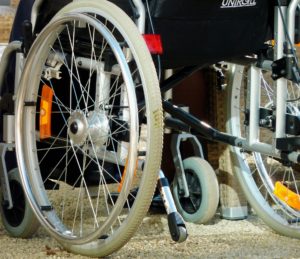 As an active and respected member of the Prosthetics & Orthotics industry, Brooke Artesi is always packed to travel – conventions, legislative rallies, certification training for the latest technologies and the rare but welcome vacation – Brooke is always on the go.
As an active and respected member of the Prosthetics & Orthotics industry, Brooke Artesi is always packed to travel – conventions, legislative rallies, certification training for the latest technologies and the rare but welcome vacation – Brooke is always on the go.
“Accessible travel” is becoming more available for people with disabilities – the travel and hotel industry is increasingly aware of the need to adapt accommodations and itineraries to meet special needs. The disabled traveler community has furthered this awareness by their social activities – websites, posts, blogs, photos and videos to inspire others to expand their horizons.
The Amputee Coalition website has a page dedicated to concerns about airport security and prosthetics – “ We [ACA] have been working with the TSA to assure that security screening is conducted in a reasonable and appropriate fashion for people with limb loss. There remain concerns about the intrusiveness of screening, exposure to radiation, and consistency of screening policies for the limb loss community, and this page is meant to provide you with the information and resources for how to prepare, what to expect, and your rights when going through airport security.”
As a seasoned traveler, Brooke has compiled a list of tips for amputees to check off when preparing for travel. Many of these tips also apply to those travelling with wheelchairs or scooters. For more tips on this type of travel, visit disability websites such as disabilitytravel.com or travelchannel.com
- Be aware of the climate and altitude of your destination – dry conditions can cause skin to become dehydrated, high altitudes can cause swelling. Pack your creams, lotions and cleansers, shrinkers – the ones you’ve successfully used at home – do not rely on hotel soaps.
- Watch changes in your diet – are you going to eat a lot of restaurant foods which may contain high amounts of salt which can cause swelling?
- Will you be doing more walking or sitting than you normally do? Remember your stump may change size during the day – pack enough socks to accommodate these changes.
- Are you planning activities out of the ordinary for you such as horseback riding or climbing? You may want to pack a support to keep your prosthesis from slipping off, perhaps an elastic sleeve.
- If your planned activities cause you to sweat a lot, take off your limb and liner several times a day and dry it with a clean towel.
- Inquire about accessibility before you pick a hotel or destination. Are there ramps, clear pathways, elevators?
- Checked out your prosthesis’ components, if you notice any breaks, loose parts, abnormal sounds, check it out with your prosthetist before you travel.
- If your prosthetic uses batteries, check out out-of-country destinations to see if you need a plug adaptor for your battery charger and be sure to bring extra batteries.
- Pack a small tool kit with a screwdriver with interchangeable bits, a small pair of scissors and a small roll of duct tape in case you need an emergency repair until you can get to a prosthetist.
- Call ahead to your airline or other service provider. They will need time to make necessary accommodations. Be clear about your needs, detail what you can and can’t do. Call again 1-2 days before you travel to confirm they are ready for you.
- Talk to your doctor about your travel plans. He/she may help you be prepared for a long flight, available medical facilities at your destination, availability of prescription refills and offer other advice. Take a doctor’s note and phone number. Travel with a statement from your doctor, preferably on letterhead, covering your condition, medications, potential complications, special needs and other pertinent information.
- If you are on medication, bring an extra medication package in your carry-on.
 Devon Gallagher, 23, an amputee from Philadelphia, was inspired to get her prosthetic covered in a chalkboard material while travelling Europe. She has since been taking pictures across the continent, which show her cycling over the canal in Amsterdam and relaxing on a wall overlooking the city of Barcelona, all with the well-known locations scrawled on her leg. Devon was born with a congenital bone disease which created a “false joint” in her right tibia, rendering her foot useless. After several unsuccessful surgeries, doctors decided to amputate her foot when she was four.
Devon Gallagher, 23, an amputee from Philadelphia, was inspired to get her prosthetic covered in a chalkboard material while travelling Europe. She has since been taking pictures across the continent, which show her cycling over the canal in Amsterdam and relaxing on a wall overlooking the city of Barcelona, all with the well-known locations scrawled on her leg. Devon was born with a congenital bone disease which created a “false joint” in her right tibia, rendering her foot useless. After several unsuccessful surgeries, doctors decided to amputate her foot when she was four.
“A lot of people don’t understand how I can be so happy in my situation. I guess I learned at a young age that life can suck and that it’s not fair at times. But you can still lead a happy and fulfilling life if you have the right attitude and choose to focus on the positives, you always have to put things in perspective, I consider myself very lucky.” – Devon Gallagher (www.dailymail.co.uk/travel/)
For those travelers using wheelchairs or scooters, here are just a few sites you might want to check out:
http://www.curbfreewithcorylee.com/ – “My name is Cory and I’m a 27 year old travel addict, hoping to inspire you to start rolling around the world.” His blog includes his list of the 20 most awesome wheelchair accessible hotels around the world.
rolling around the world.” His blog includes his list of the 20 most awesome wheelchair accessible hotels around the world.
http://www.simplyemma.co.uk/ – “Welcome to Simply Emma – a blog about my life as a disabled girl from Scotland with a passion for travel and live music.” Emma’s posts include how to discover your own home town as well as travelling to concerts and mountain treks in a wheelchair.
https://www.ricksteves.com/travel-tips/– “Your vacation doesn’t need to be a struggle — do your homework and your trip can be filled with fully accessible hotel accommodations, accessible routes between accessible tourist attractions, and wonderful accessible travel experiences.” Rick is a travel agent with a personal knowledge of wheelchair accessible destinations.

